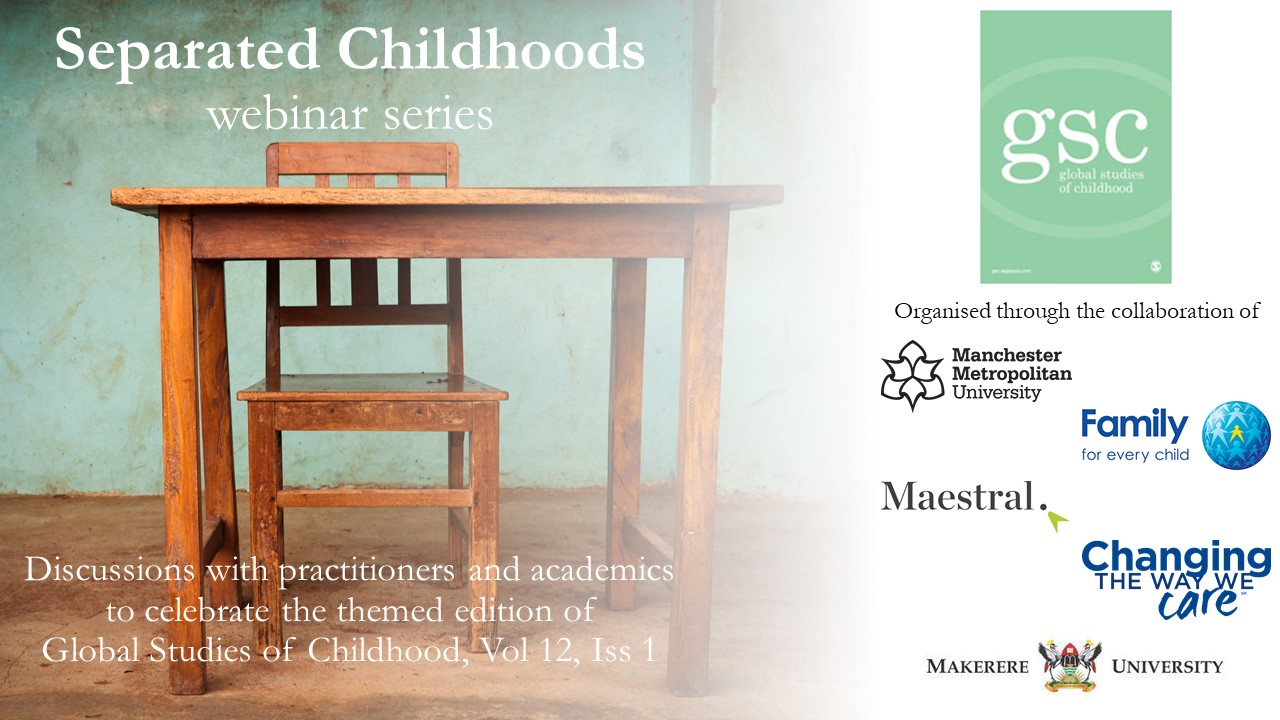
Time: 5 a.m. US east coast/ 10am UK/ 12pm Kenya/ 2.30pm India
To mark the launch of the ‘Separated Childhoods’ themed edition of Global Studies of Childhood, these organisations are hosting a series of three webinars that explore some of the themes highlighted in the featured articles. The aim of the themed edition was to create the space to gather and share new findings about separated childhoods from around the world, centring on the voices of those with lived experience of separation and on the practical experiences of social service workforce. This webinar series will create space to further discuss the topics around separated childhoods and deepen connections between academic and practitioner research.
This first webinar focuses on why children become separated and the processes leading up to such separation mean that responses to their individual situations are varied and complex. A separated child cannot just be ‘returned home’ and in many ways the child that ‘returns’ is not the same child that left. In this session we will explore the practices of separation and how different forms of separation are considered within policy and practice.
Upcoming:
Webinar #2: Identity, belonging and culture in childhood separation (June 9th - 9am Guatemala/ 11am US east coast/ 4pm UK/ 6pm Kenya/ 8:30pm India)
When we explore separated childhoods, we need to recognise the many relationships that children are a part of, how they are experienced and felt, how they change and evolve, and the interconnections that one relationship might have on another. It is critical to understanding how cultures and experiences result in individuals, families and communities assigning different values to different relationships and practices.In this session we explore the importance of children’s relationships, culture and identity in informing practice, supporting practitioners and policymakers recognizing their own culture and social norms, and the particular significance of migrant and diasporic experiences which cross cultures and impact relationships.
Webinar #3: Valuing lived experience of and local practices towards childhood separation (June 22nd - 7am Guatemala/ 9am US east coast/ 2pm UK/ 4pm Kenya/ 6:30pm India)
The aim of the themed edition was to challenge the values that privilege the expertise gained through academic training and bridge the divide between research, practice, and lived experience. We wanted to create the space to gather and share new findings from around the world, especially evidence centred on the voices of children, young people and family members with lived experience of separation, and on the practical experiences of social service workforce who are key to providing adequate support to strengthen the capacity of families to remain together and to reunite safely. This session will further develop this discussion, providing a space to share our experiences and reflect upon how we can consider both academic and practice-based knowledges equally.
Each of the 90 minutes workshops will provide a short presentation from three authors followed by an interactive discussion that we encourage you to get involved in.
Information About Zoom:
Please note all sessions will take place over Zoom and hosted by either Maestral International or Family for Every Child. Joining instructions will be sent to registered attendees one week prior to the event.
Recording of Sessions:
These sessions will be recorded with the intention of further dissemination. They recordings will be stored in the Zoom cloud account of Family for every Child and Maestral before editing and transfer to MMUtube. Please see Manchester Metropolitan’s privacy notice for online meetings and lectures for further information about how we process personal data in this way. You should inform the organiser prior to the event if you have any concerns about the session being recorded. The recordings will be reviewed for relevancy after 12 months, and deleted when no longer deemed to be relevant.
